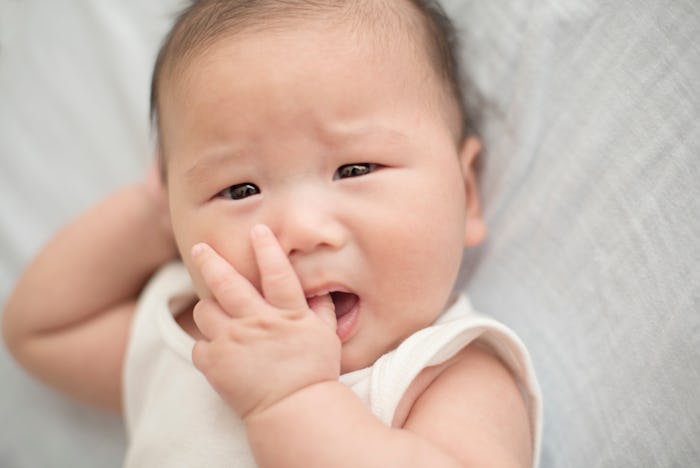Life

So This Is Why Your Baby Can't Stop Chewing On Those Cute Little Fingers
In the rare moments that your baby isn’t eating or sleeping, you may notice that they seem to spend a lot of time gnawing at their hands. While sucking on your fist probably doesn’t sound very appetizing, babies chew on their fingers for a pretty good reason.
“Infants in the first few months of life are exploring with their mouth and their hands and also find their thumb as a way to soothe themselves,” pediatrician Dr. Alison Mitzner tells Romper. “By around 3 [or] 4 months you may see a lot of drooling and babies putting their fists in their mouth. This can be a first sign of teething.”
Babies usually begin teething somewhere between 4 and 6 months old, per Parents. Their hands act like a reliable teething ring that they can access all by themselves, so it makes sense that it can become a go-to move for self-soothing.
But even before those tiny little teeth begin breaking through, babies may chew on their hands because they’re hungry, or simply because they’re exploring their immediate world. Around 2 months old, babies realize they have hands, and as you can imagine, that’s a pretty exciting development. Hand motor development is complex, and it actually moves from the pinky upward to the thumb (per Parents), so if you notice that your baby’s grabbing or swatting seems odd because they’re not using their thumb, that’s totally normal.
After a baby finds their hands, “you then notice everything will go in their mouth!” Mitzner tells Romper. “They are learning and they aren’t aware of what can and cannot go in their mouths. Baby-proofing the home is a must as they start crawling and cruising and putting [objects] in their mouth.”
You may be concerned about germs if your baby’s hands are constantly in their mouths. Mitzner tells Romper to do the best you can to keep hands clean, but don’t stress about it. “As with any child, you want to be sure that the baby’s hands are clean as this is the best way to prevent infection,” she says. “This is easier to control when they are newborns and infants, prior to them crawling around and touching everything. When they start crawling and cruising, do the best you can.”
Infants also have a natural rooting reflex that helps with feeding, and sometimes their natural inclination to suck on a bottle or a nipple can transfer to the hands. “Because thumb sucking makes babies feel secure, some babies might eventually develop a habit of thumb sucking when they're in need of soothing or going to sleep,” according to the Mayo Clinic.
Many kids will stop sucking their thumbs on their own by around the age of 4, but if you’re concerned, “after 4 years you may want to start speaking with your pediatrician and pediatric dentist to work on different techniques to wean off the habit... before any dental issues arise,” Mitzner tells Romper. “You always want to focus on positive reinforcement and praise to stop rather than negative reinforcement or punishments.”
Simply put, babies put their hands in their mouths because they can, and because it feels soothing. As long as the baby's hands are clean(ish) and that you and your doctor discuss a timeline for weaning from thumb sucking, chewing on their hands is nothing to be worried about. In fact, in can be super cute.
Experts:
Dr. Alison Mitzner, pediatrician